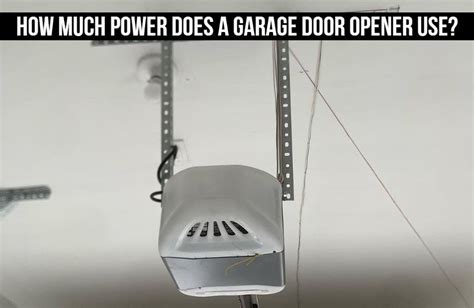How Much Energy Does A Garage Door Opener Use
Ronan Farrow
Mar 29, 2025 · 2 min read

Table of Contents
How Much Energy Does a Garage Door Opener Use?
Knowing how much energy your garage door opener consumes is crucial for budget-conscious homeowners and those striving for a greener lifestyle. While it might seem like a minor appliance, the cumulative energy use over time can add up. Let's delve into the specifics and explore ways to minimize its energy footprint.
Understanding Garage Door Opener Energy Consumption
The energy consumption of a garage door opener varies based on several factors:
Type of Opener:
- Chain-drive openers: These are generally the most energy-efficient, using less power than belt-drive or screw-drive models.
- Belt-drive openers: These are quieter than chain-drive but typically consume slightly more energy.
- Screw-drive openers: These openers offer a balance between quiet operation and energy efficiency, usually falling somewhere between chain and belt-drive models.
Frequency of Use:
The more frequently you open and close your garage door, the higher your energy consumption will be. Daily use will naturally result in higher energy costs compared to infrequent use.
Motor Size and Efficiency:
The size and efficiency of the motor significantly influence energy consumption. Newer models often boast improved efficiency ratings, using less power to achieve the same results. Look for Energy Star certified models for improved energy performance.
Standby Power Consumption:
Even when not in use, your garage door opener will draw a small amount of power to maintain its operational readiness. This standby power consumption can contribute to overall energy usage over time.
Estimating Energy Usage
It's difficult to give a precise number for energy consumption without knowing the specific model and usage patterns. However, a reasonable estimate is that a typical garage door opener uses between 10 to 50 kilowatt-hours (kWh) per year. This equates to a minimal impact on your electricity bill, likely less than $10 annually, depending on your electricity rates.
Tips for Reducing Energy Consumption
While the energy consumption is relatively low, you can still take steps to minimize it further:
Choose an Energy-Efficient Model:
When replacing your garage door opener, opt for a model with a high efficiency rating. Look for labels or specifications highlighting energy efficiency, such as Energy Star certification.
Regular Maintenance:
Regular lubrication and maintenance of your garage door opener can improve its efficiency and prolong its lifespan. This prevents unnecessary strain on the motor, reducing energy consumption.
Minimize Unnecessary Openings:
Try to limit the number of times you open and close the garage door unnecessarily. This simple practice can make a noticeable difference over time.
Conclusion
The energy consumption of a garage door opener is typically minimal. However, by choosing an energy-efficient model, performing regular maintenance, and minimizing unnecessary usage, you can further reduce its energy footprint and contribute to a more environmentally friendly approach. Remember that even small changes can have a cumulative positive impact.
Featured Posts
Also read the following articles
| Article Title | Date |
|---|---|
| How Much Pag Oil To Add When Replacing Accumulator | Mar 29, 2025 |
| How Much Does It Cost To Rebuild A Outboard Motor | Mar 29, 2025 |
| How Much Jail Time For A Probation Violation Colorado | Mar 29, 2025 |
| How Much Is 2 Dozen Cookies | Mar 29, 2025 |
| How Much Is Spinal Decompression | Mar 29, 2025 |
Latest Posts
-
How Do I Know If I Have A Gas Furnace
Apr 04, 2025
-
How Do I Know If A Patch Is Iron On
Apr 04, 2025
-
How Do I Keep Mice Out Of My Potted Plants
Apr 04, 2025
-
How Do I Identify My Antique Drawer Pulls
Apr 04, 2025
-
How Do I Identify An Artist Signature
Apr 04, 2025
Thank you for visiting our website which covers about How Much Energy Does A Garage Door Opener Use . We hope the information provided has been useful to you. Feel free to contact us if you have any questions or need further assistance. See you next time and don't miss to bookmark.
